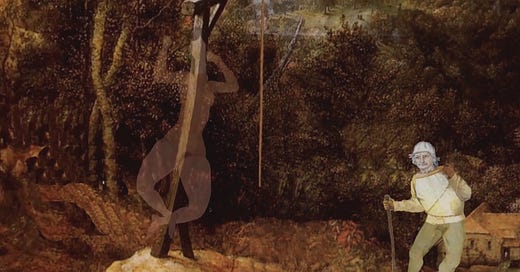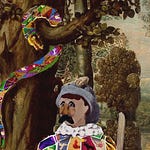XVII. LA CHANSON DE LA POTENCELa maigre amoureuse au long cou Sera la dernière maîtresse De ce traîne-jambe en détresse, De ce songe-d’or sans le sou.
Cette pensée est comme un clou Qu’en sa tête enfonce l’ivresse : La maigre amoureuse au long cou Sera sa dernière maîtresse.
Elle est svelte comme un bambou ;
Sur sa gorge danse une tresse,
Et, d’une étranglant caresse,
Le fera jouir comme un fou,
La maigre amoureuse au long cou.
XVII. GALLOWS SONGThe skinny long-necked lover shall be the last mistress of this drag-leg in distress, of this penniless dream-of-gold.
This thought is like a nail drunkenness pounds into his head: the skinny long-necked lover shall be his last mistress.
She is svelte as a bamboo cane; on her neck dances a braid, and, with a strangling caress, she will make him come like mad, the skinny long-necked lover.
NOTES (by line number, starting with the title).
1 This is the fifth rondel in Rondels Morbides, where its title is simply POTENCE.
potence : A gallows, specifically one having two vertical posts and one horizontal, often wide enough for several simultaneous hangings.
2 amoureuse : The feminine of amoureux, ‘lover’. Since DAf1835 amoureux and « amour-euse » have been theatrical jargon, equivalent to English ‘love interest’.
3 In Rondels Morbides this line and the two following read « Sera leur dernière maîtresse, / A ces traine-jambe en détresse, / A ces songe-d’or sans le sou. » Similar changes have been made to lines 7 and 9, and even more severe changes to lines 11 and 12, making the plot quite incoherent. See Appendix D for details.
4 traîne-jambe : Literally, ‘drag-leg’; figuratively, presumably a metonym for a person crippled by having one leg paralyzed or otherwise useless, a “drag-leg” as used by Zorah Neale Hurston in Jonah’s Gourd Vine, 1934, her first novel. Hurston’s phrase appears never to have been used, by her or others, in any other text available in on-line. On-line corpora do contain several instances of the French expression: all but two are in various printings of Giraud’s rondel or in quotations from it. The first exception appeared in 1910 in the Belgian literary magazine Le Thyrse, in prose poetry with the collective title Pages Agrestes (viz., Rude Pages)—by D.-J. Debouck (a Walloon), reprinted in his collection Vies agrestes (contes et nouvelles). The second exception appeared in 1911 in Bulletin du dictionnaire général de la langue wallone in an article by the linguist Jean Haulst (also a Walloon): after remarking on the worthlessness of a certain folk-etymology (reported from Belgian Luxembourg) for the Walloon phrase hatch-la-pate, Haulst glosses that phrase as « traîne-jambe ». I infer that (1) « traîne-jambe » was rude—maybe very rude—slang among (at least) French-speaking Walloons of the generation of Debouck, Haulst, and Giraud; (2) “drag-leg” was likewise among the speakers of African-American Vernacular English in Hurston’s novel; and, further, (3) the absence of other instances in the corpora may reflect (self-)censorship by other writers from those speech communities.
5 songe-d’or : Literally, either ‘(a) dream of gold’ or ‘(one who) dream(s) of gold’, according as one chooses to parse « songe » as a singular noun or finite verb; figuratively (if referring to a person, as would have to be so in the rondel), presumably a metonym for someone who (day-)dreams of wealth. I have found no other instance of « songe-d’or » with this latter meaning in on-line corpora. (In fact, I can find no other instances with the hyphen at all, and among several hundred unhyphenated instances I think none can reasonably be read to have the latter meaning. Changing or to argent makes no difference.) Since my presumed interpretation of the phrase hardly seems rude, I suggest that was not an idiom for Giraud, but rather that he coined it. As to what might have moved him to do so, P. Larousse’s Dictionnaire Universel du XIXe Siècle [etc.] (Paris, 1872) suggests a hypothesis: Larousse’s article on the Théâtre des Funam-bules notes that its star Jean-Gaspard Deburau, perhaps the most influential Pierrot of all time, played there in a version of Le Songe d’Or by Charles Nodier.
sans le sou : The « sou » was never the very smallest unit of French currency, but it was always a coin of little value minted of base metal (copper or nickel, not gold or silver). Though no edition of DAf defines « sans le sou », all but the current one record that pas le sou means ‘penniless’, ‘having no money at all’.
9 sa : Although the rondel form demands that this line duplicate the third, context has forced Giraud to change « la », ‘the’, to « sa », ‘his’.
10 un bambou : A walking stick made of bamboo. Such a stick (called a ‘whangee’ in 19th century English) is more flexible than a wooden one of the same size.
13 jouir : To ejaculate (semen), in accord with the folk belief that a hanged man will ejaculate at the instant his spinal cord breaks.
comme un fou : Literally, ‘like a madman’. Figuratively, copiously, in (unreasonable) excess.
14 In Rondels Morbides this line ends in an exclamation point.









Share this post